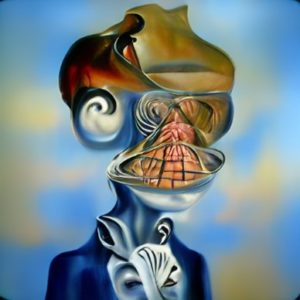Did a friend tell you that they think the entire experience of going to a concert seems surreal? This post unpacks the meaning and origin of this expression.
Meaning
The word ‘surreal’ refers to a life experience that seems challenging to understand or strange. The experience may feel dream-like to the person and can describe positive or negative situations. For instance, it might seem surreal if you’re being robbed at gunpoint.
If your boss promotes you unexpectedly at work, it could also be a surreal experience. If something is surreal, it’s marked by a sense of irrationality and confusion, like you don’t know what’s happening around you. You may feel like you can’t believe what’s happening and want to pinch yourself to see if you’re dreaming.
If something is surreal, it’s hard to believe. You’ll feel mental resistance against accepting it in your consciousness.
Example Usage
“This is all so surreal to me. I can’t believe this is all taking place right now. It’s like something out of a dream.”
“This is one heck of a surreal experience. I need to pinch myself to see if I’m dreaming. I just can’t believe this is happening.”
“The feeling at the meeting was surreal. It’s like no one there knew what they were doing or what they were there to accomplish. I’ve never experienced anything like that in my career.”
“This whole vacation is surreal to me. I know I’m here and having the time of my life, but it feels like I’m dreaming.”
“This situation is surreal. I don’t know how things went the way they did, but somehow, I got what I wanted out of the negotiations.”
“This is so surreal. One week I have a happy family; the next, they leave me. I can’t believe this is happening to me right now.”
This is all so surreal. I can’t believe I got accepted to Harvard. I had a dream last night that I received my welcoming letter.”
“Everything seems surreal like it's not really there. I feel like I’m spaced out, and none of this is really taking place around me.”
“This entire experience was so surreal. I keep wondering if it was all a dream or if I was really there. These kinds of experiences always play with my mind for days.”


Origin
The term ‘surreal’ originates from the French word ‘surréalisme,’ meaning ‘beyond realism.’ Guillaume Apollinaire coined the word in 1917, with Andre Breton using it as the name for the movement he started in 1924, ‘Manifeste de Surréalisme.’
‘Surreal’ entered the English lexicon in 1927 as the French spelling before changing to the current version in 1931. Guillaume Apollinaire used the term in his work ‘Notes to Parade,’ where it appears as follows in the French spelling.
“De cette alliance nouvelle, car jusqu'ici les décors et les costumes d'une part, la chorégraphie d'autre part, n'avaient entre eux qu'un lien factice, il este résulté, dans 'Parade,' une sorte de surréalisme.”
Phrases Similar to Surreal
- Unreal
- Bizarre
- Unusual
- Weird
- Uncanny
- Dreamlike
Phrases Opposite to Surreal
- Realistic.
- natural.
- sincere.
- genuine.
What is the Correct Saying?
- Surreal.
Ways People May Say Surreal Incorrectly
The term ‘surreal’ describes a situation that feels unreal or difficult to comprehend. It doesn’t refer to realistic objects or full consciousness where you’re aware of your surroundings.
Acceptable Ways to Phrase Surreal
You can use ‘surreal’ to describe an experience that feels real but is strange and challenging to understand. It’s almost like you’re in a dream state but fully conscious of what’s happening around you. You can use surreal in professional and social conversations. For instance, you could use it at work to describe how receiving a promotion seems surreal.
You could use it at home when describing a situation that seems unbelievable or impossible to fathom. If something is surreal, it’s hard to believe and seems like a dream. The phrase suits verbal exchanges and text conversations.